WhatsApp groups help get food to those who need it
- Published
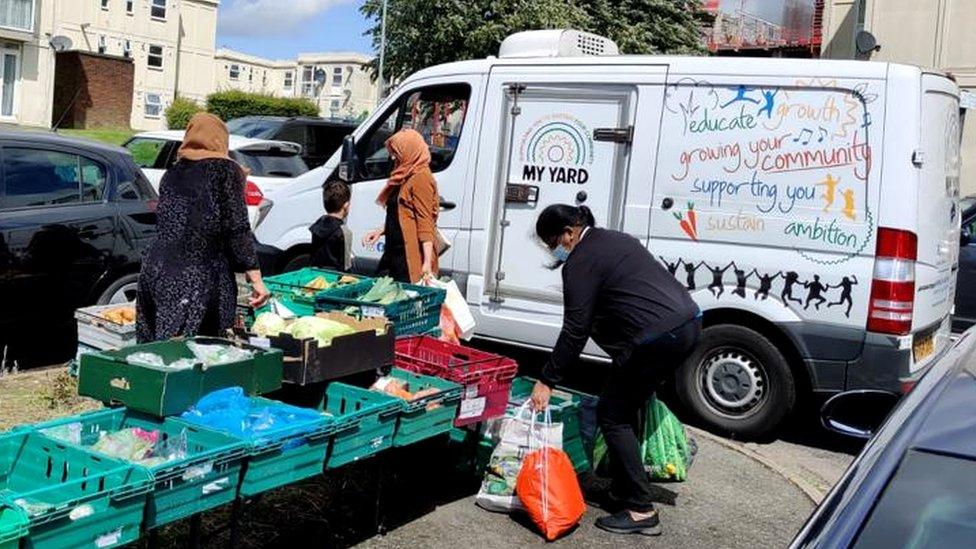
My Yard distributes food donated by supermarkets
"Hey everyone, there's a food delivery today at 3pm." "Thanks for the curry, it was amazing!" "I made pickles this week." "Should we all have an outing somewhere soon?"
These are the kind of messages that fly back and forth, pretty much constantly, on Rachel Diamond's phone.
Ms Diamond is the founder of My Yard, a charity. For each of the communities she is plugged into, she runs a WhatsApp group, such as the one she set up in 2018 for dozens of people who live on the Grange Farm Estate in Harrow, north-west London.
"It not only feeds people, it brings the community together," explains Ms Diamond.
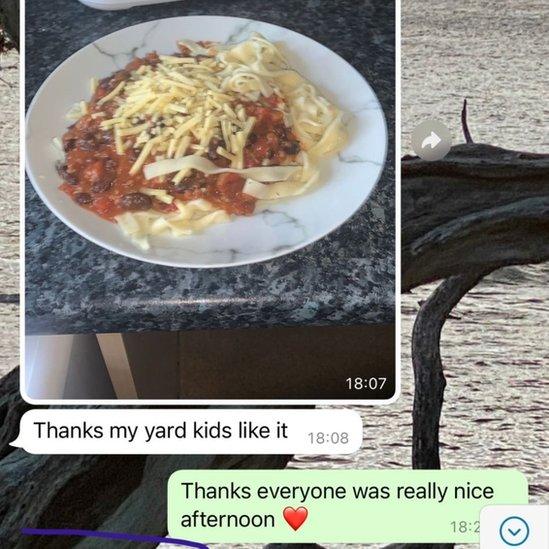
WhatsApp groups can help people source food and build community bonds
Many residents on the estate are among the millions of people in the UK who are currently experiencing food insecurity.
The cost of living crisis has sent demand for food aid soaring. You'll have heard of food banks but food aid takes many different forms. Some are less visible than others and, around the country, many people are now quietly organising the sharing and redistribution of food themselves.
Often, it starts with a WhatsApp group for friends and neighbours.
When she first started working with the Grange Farm Estate community, Ms Diamond found that using a messaging app allowed her to organise deliveries of food donated by supermarkets and local businesses at the residents' convenience.
"It was a stigma-free way of people accessing food and getting to know each other," she says. "For me, it's really, really special."
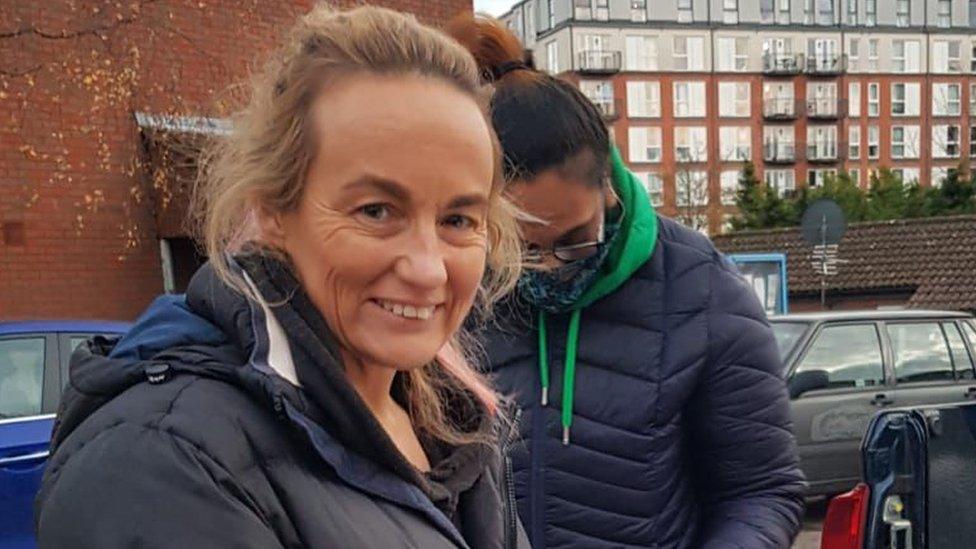
Rachel Diamond has about 20 messaging groups focused on food
Now she has about 20 groups that are swapping messages about food.
It has helped her keep in touch with those who have dietary requirements or particular preferences. Some of the elderly people find that the price of Spam has gone up a lot lately, so she gets dented tins unwanted by shops.
Everyone is different, she stresses, asking me to imagine freezing a supermarket in time and having a look inside every shopper's basket: "I bet you'd never find two baskets with the same things in. That is people's lives."
She aims to supply a diverse variety of food that suits everyone. But due to inflation, the overall need is growing. "It's devastating," says Ms Diamond, referring to the cost of living crisis.
On one recent delivery, a van arrived packed with pallets of food including fresh fruit and vegetables, breads and yoghurt, among other items. Everything went in about ten minutes, she says. It used to take noticeably longer.
While Ms Diamond has been running WhatsApp groups for communities for years, new ones are springing up all the time elsewhere.
Last November, Camille Desprez, founder of Food Next Door, launched a group for the residents of her block of flats in Brixton so that they could share surplus food with one another and cut down on waste.
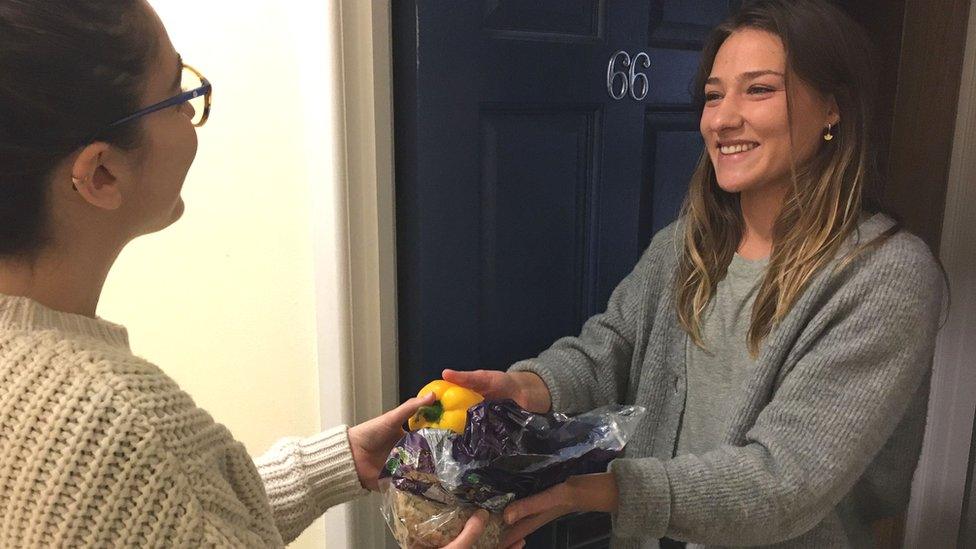
Camille Desprez (right) set up a group to share surplus food in her building
"[It's] working super well. We are able to save food almost every week," she says.
Ms Desprez has since developed the idea into the Food Next Door project, which has more than 100 members and which is establishing WhatsApp groups across more than a dozen neighbourhoods in London and Paris.
One benefit, she adds, is that people can save money on food, noting that among those currently taking part are some refugees.


Zero Waste initiatives that help people in poverty are a "positive side-effect" of the movement, says Zero Waste consultant Rachelle Strauss.
"People are genuinely very frightened and very scared about their future," she adds, noting the seriousness of the current situation.
While WhatsApp, being so widely used, has its benefits, it also has downsides, says Prof Reem Talhouk at Northumbria University. The messaging app sometimes goes down for hours at a time. This could be significant for anyone depending on the app for aid or their livelihood.
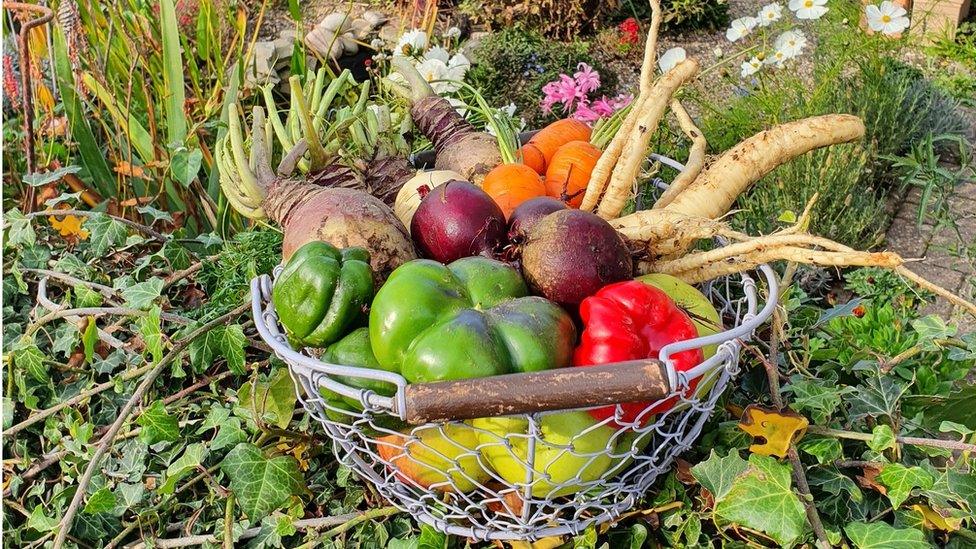
Messaging apps can help share surplus allotment produce
Alternative apps include Telegram and Signal. Volunteers for the Foodshare Allotment at Nottingham Trent University stay in touch via Microsoft Teams chat. Some food from their allotment goes to food banks, community kitchens and local families.
And plenty of people share food without much need for the latest technology - such as Ursula Juta, senior project officer at the Norfolk Rivers Trust, who puts a basket full of surplus veg from her allotment on her garden wall. People in her village can enjoy the produce for free.
Another issue with WhatsApp and other social media platforms raised by Prof Talhouk is that they can sometimes be used for misinformation, scamming and harassment.
"That's always something that we need to consider," she says.
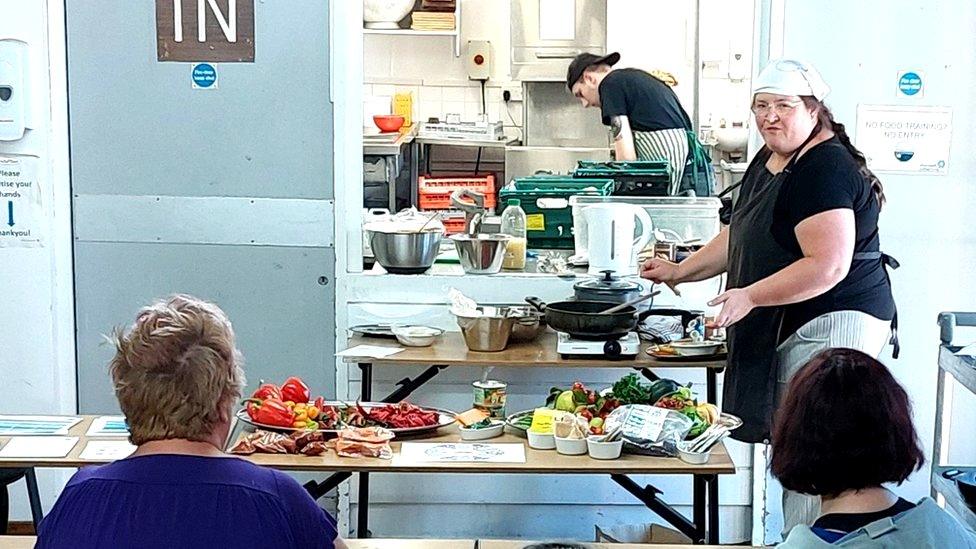
Emily Connally from the Cherwell Collective gives a cookery class
And yet the potential power of messaging apps is hard to overstate. Another food aid provider who uses WhatsApp is Emily Connally, managing director of Cherwell Collective, a non-profit in Oxford.
"We can mobilise 200 people with one text," she says, noting how she doesn't get as immediate a response on Facebook as she does via her WhatsApp group. This matters because she sometimes receives a donation of food that is near to its use by date, meaning it must be distributed very quickly.
The local Pret a Manger recently donated a surplus of 165 sandwiches. A message went out to the WhatsApp group and people had collected all the sandwiches within an hour, says Dr Connally.
Hundreds of locals rely on the food aid that she and her colleagues provide. "We've seen a pretty dramatic increase and I think it will get much, much worse," she says, referring to rising food prices.
Cherwell Collective was founded during the pandemic. Prof Talhouk suggests that local community groups that respond to crises might need support, for example from local authorities, to continue their work long-term.
Back at My Yard, Rachel Diamond stresses that the impact of the groups she runs is not restricted to food aid. People help each other out with other problems, too. They confront loneliness and strengthen social bonds.
"I find it absolutely fascinating," she says, "watching people grow in their friendships - and their hope".